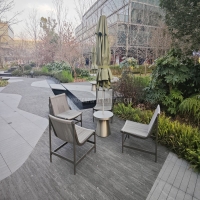Welcome to the website for landscape facilities products and knowledge.
How does the choice of grout or joint material impact the durability and maintenance of tiled landscape bar counters?
The selection of grout and joint materials represents a critical yet often overlooked factor in determining the long-term performance and maintenance requirements of tiled landscape bar counters. Unlike interior applications, exterior counters face constant assault from weather elements, temperature fluctuations, and UV exposure, making material choices particularly significant.
Epoxy-based grouts have emerged as the premium choice for outdoor applications due to their non-porous nature and exceptional resistance to moisture penetration. These synthetic compounds create an impermeable barrier that prevents water infiltration—the primary cause of tile failure in outdoor settings. While initially more expensive than traditional options, epoxy grouts ultimately reduce maintenance frequency and extend the counter's lifespan significantly.
Cementitious grouts, though economical, present considerable challenges in exterior environments. Their porous structure absorbs moisture, leading to cracking during freeze-thaw cycles and promoting mold or mildew growth in humid conditions. Without meticulous sealing and frequent resealing—typically required annually—cement-based grouts deteriorate rapidly, compromising both structural integrity and aesthetic appeal.
The width of joints similarly influences durability. Narrow joints (1/8 inch or less) minimize exposure to elements but require precisely sized tiles and expert installation. Wider joints accommodate natural material variations but increase the surface area requiring protection. For irregular stone or handmade tiles, wider joints paired with high-performance grouts often provide the optimal balance.
Maintenance implications vary dramatically between materials. Epoxy grouts typically need only occasional cleaning with pH-neutral cleaners, while cement grouts demand rigorous sealing regimens and often stain irreversibly without immediate spill cleanup. In landscape applications where leaf tannins, berries, and organic matter frequently contact surfaces, stain resistance becomes particularly valuable.
Advanced hybrid polymers now offer middle-ground solutions, blending cement's workability with enhanced durability characteristics. These modifiers improve flexibility, reducing cracking from substrate movement, and provide better water resistance than standard cement grouts while remaining more affordable than pure epoxy systems.
Ultimately, the ideal selection balances initial investment against long-term maintenance commitments. For permanent installations where minimal upkeep is desired, premium epoxy grouts deliver superior performance. In temporary or budget-conscious projects, modified cement grouts with professional sealing may provide adequate service life. Regardless of material, proper installation including slope for water runoff and periodic inspection of sealant integrity remains essential for ensuring the longevity of tiled landscape bar counters.
Related search:

Recommendation
Metal structure rattan chair without armrests for single person, with woven seat and backrest.